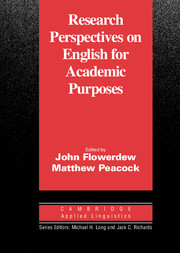Book contents
- Frontmatter
- Contents
- List of contributors
- Series editors' preface
- Preface
- I ISSUES IN ENGLISH FOR ACADEMIC PURPOSES
- Introduction to Part I
- 1 Issues in EAP: A preliminary perspective
- 2 Language use, language planning and EAP
- 3 EAP-related linguistic research: An intellectual history
- 4 Linguistic research and EAP pedagogy
- 5 International scientific English: The language of research scientists around the world
- 6 Discipline specificity and EAP
- 7 World Englishes: Issues in and from academic writing assessment
- 8 Addressing issues of power and difference in ESL academic writing
- 9 ‘I'll go with the group’: Rethinking ‘discourse community’ in EAP
- 10 EAP assessment: Issues, models, and outcomes
- II THE ENGLISH FOR ACADEMIC PURPOSES CURRICULUM
- References
- Index
Introduction to Part I
Published online by Cambridge University Press: 05 October 2012
- Frontmatter
- Contents
- List of contributors
- Series editors' preface
- Preface
- I ISSUES IN ENGLISH FOR ACADEMIC PURPOSES
- Introduction to Part I
- 1 Issues in EAP: A preliminary perspective
- 2 Language use, language planning and EAP
- 3 EAP-related linguistic research: An intellectual history
- 4 Linguistic research and EAP pedagogy
- 5 International scientific English: The language of research scientists around the world
- 6 Discipline specificity and EAP
- 7 World Englishes: Issues in and from academic writing assessment
- 8 Addressing issues of power and difference in ESL academic writing
- 9 ‘I'll go with the group’: Rethinking ‘discourse community’ in EAP
- 10 EAP assessment: Issues, models, and outcomes
- II THE ENGLISH FOR ACADEMIC PURPOSES CURRICULUM
- References
- Index
Summary
This first part of the two-part collection, Research Perspectives on English for Academic Purposes, presents a state-of-the-art collection of research and critical review studies of key issues in the field. Issues included in the collection are as follows: EAP and language planning, linguistic research related to EAP, the application of linguistic research to EAP, the concept of International Scientific English, the role of background knowledge in EAP competence, EAP testing and World Englishes, appropriate pedagogy in peripheral ESL contexts, the notions of power, culture and discourse community, and issues surrounding the international EAP placement tests TOEFL and IELTS.
The first, introductory chapter, by the editors, provides an overview of some of the key issues in EAP – the global need for English, the development of EAP as a discipline, the various types of EAP, EAP's defining characteristics, language description in EAP research, narrow versus wide angle perspectives on course design, collaboration with subject specialists, ethnography and culture, and critical perspectives.
The first chapter of the main body of Part I, on EAP and language planning by Chris Kennedy, begins by considering the growth of English worldwide, which Kennedy sees as a largely unplanned change. He then moves on to look at attempts by various bodies to control or expand the spread of English as an international language. This control is attempted through language planning, of which there are various types.
- Type
- Chapter
- Information
- Publisher: Cambridge University PressPrint publication year: 2001



